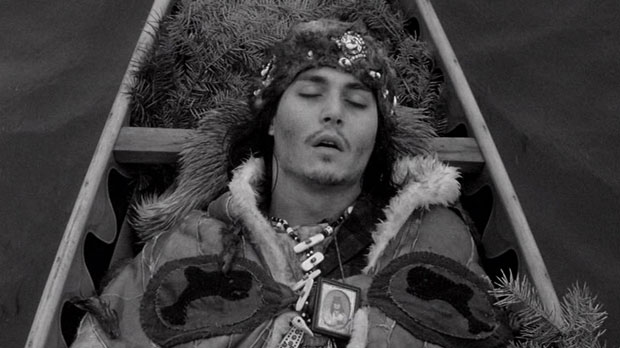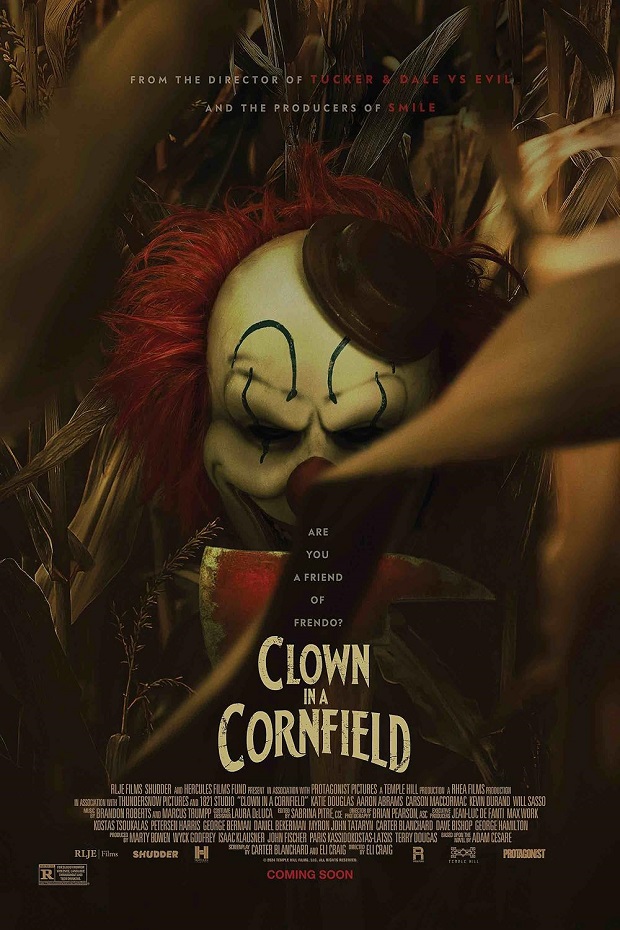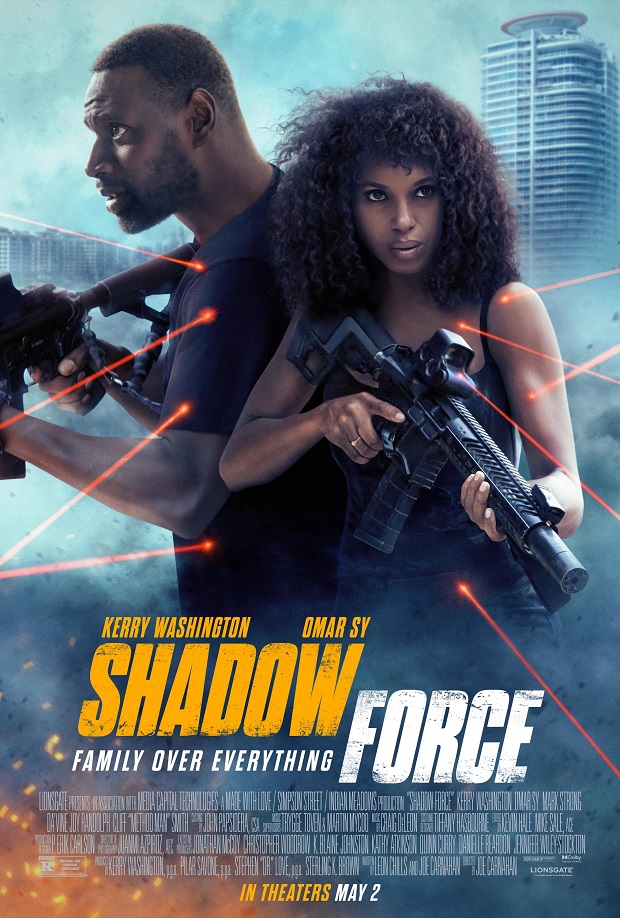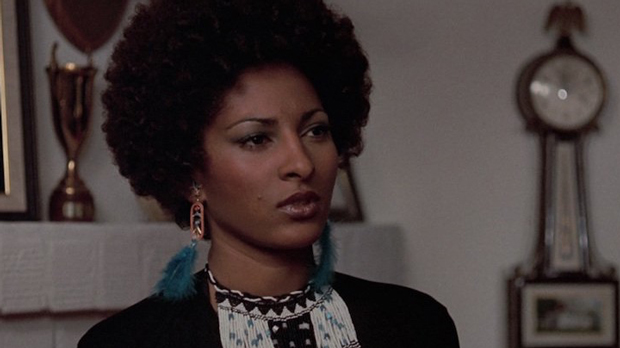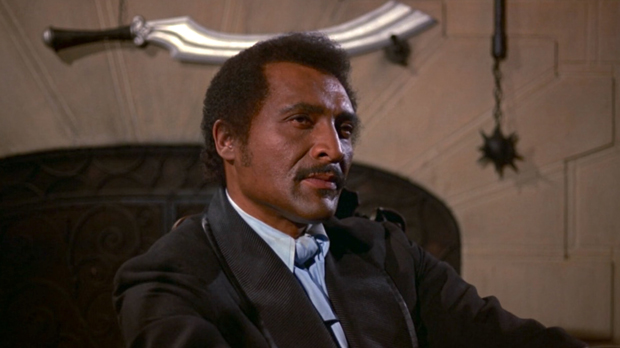 Dead Man (1996) Miramax/Western-Drama RT: 121 minutes Rated R (moments of strong violence, a graphic sex scene, brief nudity, some language, peyote use, general weirdness) Director: Jim Jarmusch Screenplay: Jim Jarmusch Music: Neil Young Cinematography: Robby Muller Release date: May 10, 1996 (US) Cast: Johnny Depp, Gary Farmer, Lance Henriksen, Michael Wincott, Robert Mitchum, John Hurt, Gabriel Byrne, Crispin Glover, Billy Bob Thornton, Iggy Pop, Jared Harris, Eugene Byrd, Mili Avital, Alfred Molina, Jimmie Ray Weeks, Mark Bringleson, John North. Box Office: $1M (US)
Dead Man (1996) Miramax/Western-Drama RT: 121 minutes Rated R (moments of strong violence, a graphic sex scene, brief nudity, some language, peyote use, general weirdness) Director: Jim Jarmusch Screenplay: Jim Jarmusch Music: Neil Young Cinematography: Robby Muller Release date: May 10, 1996 (US) Cast: Johnny Depp, Gary Farmer, Lance Henriksen, Michael Wincott, Robert Mitchum, John Hurt, Gabriel Byrne, Crispin Glover, Billy Bob Thornton, Iggy Pop, Jared Harris, Eugene Byrd, Mili Avital, Alfred Molina, Jimmie Ray Weeks, Mark Bringleson, John North. Box Office: $1M (US)
Rating: *** ½
I got the distinct impression I was the only one at the pre-release screening who liked Jim Jarmusch’s postmodern western Dead Man. Perhaps it’s because I was the only one applauding when it was over. I got some funny stares that night. I can see where mainstream audiences wouldn’t like it. It’s weird. Filmed in monochromatic black and white, it’s a western only in the academic sense. It takes place in the Old West and contains all the usual western motifs and character archetypes. At that point, Jarmusch completely deconstructs the genre to create a truly visionary film. It’s NOT the stuff of a John Wayne or Clint Eastwood oater as you can plainly see.
Johnny Depp (Ed Wood) plays a man called William Blake (yes, just like the 19th century English poet!) who we first meet on a slow train to the small industrial frontier town of Machine where an accounting job supposedly awaits him. Decked out in a ridiculous checkered suit, wire-rimmed glasses and a pork pie hat, it’s a long ride undertaken mostly in silence. He passes the time looking out the window at the bleak landscape, checking out his fellow passengers and staring into space. Finally, somebody talks to him. It’s the train’s soot-covered fireman (Glover, River’s Edge) who informs Blake Machine is the “end of the line” and he’s “just as likely to find [his] own grave” there. Sounds portentous to me.
When Blake finally arrives in Machine, he finds an ugly, dirty place populated by unfriendly people who openly display their hostility towards the stranger. He goes to the metal works factory that hired him only to find out the position was filled by somebody else. When he attempts to speak to the owner John Dickinson (Mitchum in his final role) about it, he tells him to get lost while aiming a shotgun at him.
With no job and no money to go back to Cleveland, Blake wanders aimlessly before meeting Thel (Avital, Stargate), a former prostitute turned flower seller who takes him back to her room and into her bed. Unfortunately, her ex-boyfriend Charlie (Byrne, The Usual Suspects) shows up and shoots her dead in a fit of jealousy. The bullet passes through her into Blake, mortally wounding him. He kills Charlie before stealing his horse and riding off into the untamed frontier.
It turns out Charlie is Dickinson’s son and he is one pissed-off old man! He hires a trio of bounty hunters- cannibalistic Cole (Henriksen, Aliens), talkative Conway (Wincott, The Crow) and “The Kid” (Byrd, Sleepers)- to track down Blake and bring him back dead or alive.
Meanwhile, Blake wakens to find a large Native American (Farmer, Powwow Highway) trying to remove the bullet lodged near his heart, too near to be removed successfully. He calls himself Nobody and believes that his new traveling companion is the reincarnation of the poet Blake. Never mind that this Blake has never heard of his namesake. ANYWAY, Blake’s death is imminent. With Nobody acting as his guide, he sets off to his new spiritual destination to accept his fate with hired killers and lawmen in pursuit.
What does Dead Man mean? That’s a good question. It could be interpreted in more than one way. It’s obviously an allegory, but for what? I believe Depp’s character is meant to represent a dying way of life with the old frontier giving way to industrialization. Furthermore, the wilderness through which Blake travels with his spiritual guide could be some kind of Purgatory. Their journey is surreal to say the least. It’s also quite violent as they are occasionally compelled to kill people looking to collect the hefty reward promised in exchange for Blake on the wanted posters.
One thing I know for certain is that factory owner Dickinson is Satan incarnate. I can support this assertion. Contrary to widespread belief, the phrase “what the dickens” has nothing to do with Charles Dickens. It predates the Great Expectations author by at least 200 years. In those days, the word “dickens” was interchangeable with “devil”. It comes from the term “devilkin”. Therefore, “what the devil” and “what the dickens” are basically the same thing. And there you go!
Okay, so Dead Man doesn’t fit neatly into any one interpretation, but that’s precisely the point. Jarmusch wants to keep the viewing audience off-balance. It’ll have you thinking during and long after it. A person could go mad trying to figure it all out it’s so elusive in its meaning (or meanings). Whatever its meaning, there’s no denying Dead Man is a true work of art. The stark images of the natural world bring out both its surface beauty and inherent cruelty. The cinematography by Robby Muller emphasizes the existential loneliness of the two main characters as does the haunting minimalist score by Neil Young. Most of the time, it’s the strumming of a single guitar. If it sounds improvised, that’s because it is. The rocker composed it while watching the movie. The editing by Jay Rabinowitz is quite remarkable too. Instead of cutting to the next scene, he employs blackouts as if they were stanzas of a poem with each one marked by an ominous-sounding guitar riff from Young.
As per usual, Jarmusch assembled an eclectic cast for Dead Man. Depp, playing an Everyman trapped in a bizarre place between life and death, does a wonderful job in the lead. However, it’s Farmer that steals the show as Nobody who talks in New Age-y terms as he guides the “stupid f***ing white man” to his final resting place. Like Blake, he too is an outcast among his own people. He explains that his mother and father were from different tribes which made him a reject. He further explains his capture by white men, stint as a circus attraction and education in England where he developed his love for the poet/painter Blake. He’s the one that provides most of Jarmusch’s trademark droll humor. The cool supporting cast also includes John Hurt (The Elephant Man) as the office manager at the factory and Billy Bob Thornton (Sling Blade), punk rocker Iggy Pop (Tank Girl) and Jared Harris (I Shot Andy Warhol) as a trio of trappers.
Dead Man is a movie that will only appeal to a limited audience. It’s simply too strange for some tastes. It’s true it moves at a slow pace, but that’s intentional. Jarmusch wants us to meditate on what we see and hear. It’s not so much a movie as it is an experience of the mind. It’s a change of pace for the director typically known for deadpan comedies like Stranger Than Paradise, Down by Law, Mystery Train and Night on Earth. He takes a classic American genre and sets it in a Kafkaesque universe where the bizarre is considered normal. It’s a unique vision marked by references to the poet Blake’s work and aspects of 20th century culture- e.g. the two marshals chasing Blake are named “Lee” and “Marvin”. I’d even say Dead Man is poetic. I’ve always enjoyed bizarre movies; this one occupies its own level of weirdness. I haven’t figured it all out yet and maybe I never will, but that’s what makes it great!
